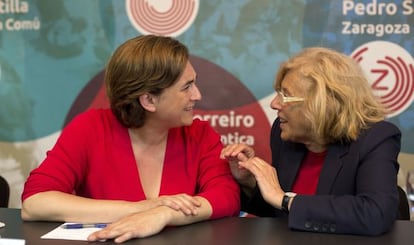Madrid and Barcelona city councils launch plan to help refugees
Measures aimed at finding ways of channeling citizen assistance for asylum seekers

The new leftist city councils in Madrid and Barcelona have announced that they will be introducing measures to assist refugees who have been arriving in Western Europe over the summer in increasing numbers from conflict-stricken countries such as Syria.
The mayor of Barcelona, Ada Colau, said this week that her council would be creating a register to which families who want to help refugees could sign up. They will be able to offer places to stay or make aid donations.
Barcelona Mayor Ada Colau said her council would be putting a register in place to which families who want to help refugees can sign up
Madrid Mayor Manuela Carmena has since followed suit and announced during a radio interview on Wednesday that the capital would be joining the network of support proposed by her opposite number in Barcelona.
Carmena – who came to power in May with the Ahora Madrid party, a leftist bloc containing members of emerging political force Podemos, among other groups – said during her interview that she would be meeting with Colau on Friday. “I will talk to Colau, I am interested because we are two big, albeit different, cities, but we are welcoming,” she told the Onda Cero network. “We are creating a list of housing and places to stay for the possible quotas of refugees that may be assigned to us.”
Asked who would set that quota, the mayor responded that it would be subject to the criteria of the central government. “We are willing to do whatever is necessary to take in whoever needs help, but we want the government to tell us how many people are going to arrive in Madrid.”
The mayor of Valencia, Joan Ribó, has also announced that he intends to sign up to Colau’s proposal to create a “network of refuge cities,” but said he first wanted to know exactly “what the Valencia regional government and the central government will do.”
The Spanish prime minister, Mariano Rajoy, said on Tuesday that he was willing to increase the number of refugees that Spain had accepted until now. “The [European] Commission had made a proposal, we negotiated, and in the end, we took the decision to accept 2,739 [refugees],” Rajoy said during an official visit to Germany. “We are willing to talk about the issue, because this is a position that could be changed, but there are things we have to talk about first with the European Commission.”
The plan announced by Ada Colau – a former anti-evictions activist who came to power in the May municipal elections with citizen platform Barcelona en Comú – aims to channel citizens’ willingness to offer help to the refugees, according to her team. In Catalonia, there are currently only 28 places available for asylum seekers, with a maximum stay of six months. For now, the council has ruled out installing a large shelter in the municipal area, but is studying a temporary center in the metropolitan area.
The mayor of Valencia wants to sign up to Colau’s proposal but first wants to know “what the Valencia regional government and the central government will do”
For its part, Madrid Mayor Manuela Carmena’s team has called on the central government to be “up to the job in hand,” to take responsibility, and to coordinate the “necessary response with regional and municipal administrations.”
In Madrid, the Labor Ministry’s Refugee Attention Centers “are overcrowded and have long waiting lists,” according to the council, adding that this is prompting asylum seekers to have to resort to aid for the homeless, much of which is provided by municipal services.
English version by Simon Hunter.
Tu suscripción se está usando en otro dispositivo
¿Quieres añadir otro usuario a tu suscripción?
Si continúas leyendo en este dispositivo, no se podrá leer en el otro.
FlechaTu suscripción se está usando en otro dispositivo y solo puedes acceder a EL PAÍS desde un dispositivo a la vez.
Si quieres compartir tu cuenta, cambia tu suscripción a la modalidad Premium, así podrás añadir otro usuario. Cada uno accederá con su propia cuenta de email, lo que os permitirá personalizar vuestra experiencia en EL PAÍS.
En el caso de no saber quién está usando tu cuenta, te recomendamos cambiar tu contraseña aquí.
Si decides continuar compartiendo tu cuenta, este mensaje se mostrará en tu dispositivo y en el de la otra persona que está usando tu cuenta de forma indefinida, afectando a tu experiencia de lectura. Puedes consultar aquí los términos y condiciones de la suscripción digital.








































